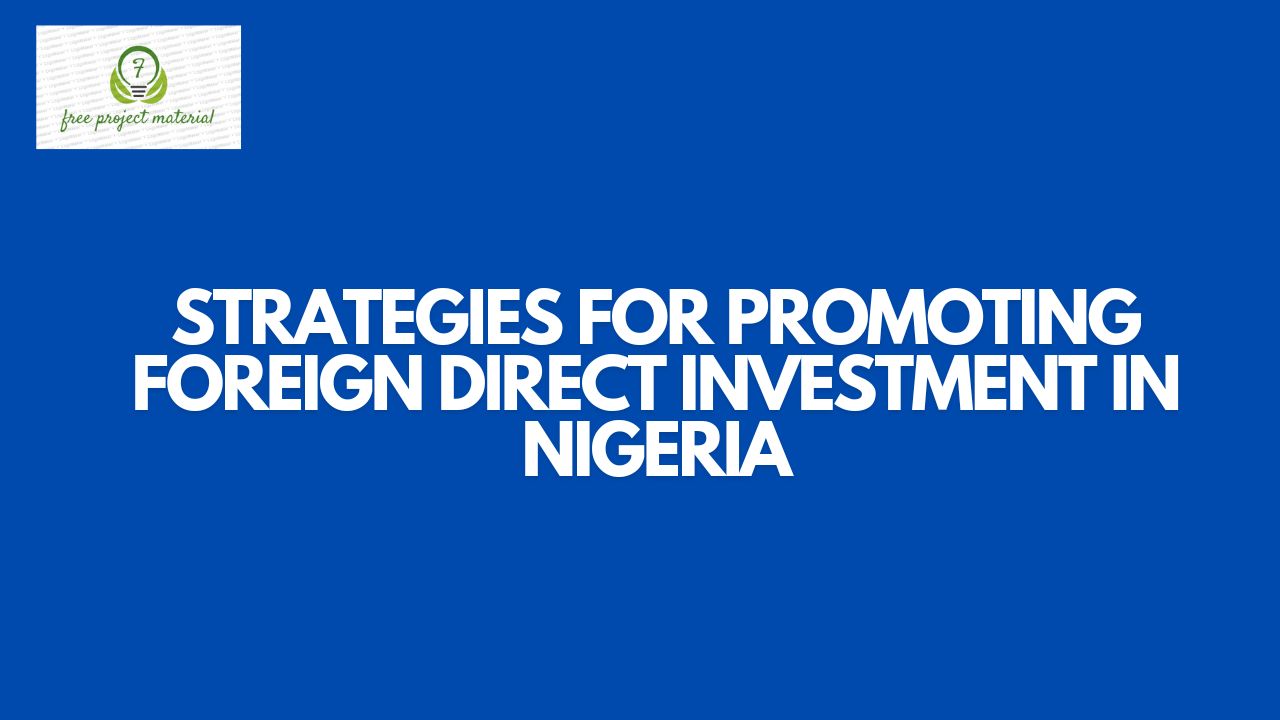ABSTRACTS
This research work focused on strategies for promoting foreign direct investment in Nigeria (A case study of Nigeria Investment Promotion Commission, Uyo). To achieve the research objectives, the study made use of survey research design. Taro Yamene formular was used to select fifty-two (52) respondents as sample size for the study. The instrument of data collection was self- developed questionnaire and the forms were personally administered. Simple frequency tables and percentages were used to analyzed the data. The findings revealed that that tax incentives has a positive impact in promoting foreign direct investment; that infrastructural development has a positive impact in promoting foreign direct investment; that political stability has a positive impact in promoting foreign direct investment; that skilled workforce has positive impacts in promoting foreign direct investment. Thus, to improve on the inflow of our foreign direct investment (FDI), Government should therefore invest more in infrastructure (like power, communication, transportation and energy) and ensure the availability of other needed facilities that can attract and boost the productive capacity of direct foreign investors, so that more investors can come into the country since effective productivity of present direct investors will attract more foreign investors.
TABLE OF CONTENTS
Title page – – – – – – – – –
Approved page – – – – – – – –
Certification – – – – – – – –
Dedication – – – – – – – – –
Acknowledgement – – – – – – –
Abstract – – – – – – – – –
List of Tables – – – – – – – –
Table of Contents – – – – – – – –
CHAPTER ONE
INTRODUCTION
1.1 Background of the Study – – – – – –
1.2 Statement of the Problem – – – – – –
1.3 Objective of the study – – – – – –
1.4 Research Question – – – – – – –
1.5 Significance of the Study – – – – – –
1.6 Scope of the Study – – – – – – –
1.7 Limitations of the Study – – – – – –
1.8 Organization of the Study – – – – – –
1.9 Definition of Terms – – – – – – –
CHAPTER TWO
REVIEW OF RELATED LITERATURE
2.1 Conceptual Framework
2.1.1 Concept of Foreign Direct Investment
2.1.2 Importance of Foreign Direct Investment
2.1.3 Impact of Tax Incentives in Promoting Foreign Direct Investment
2.1.4 Impact of Infrastructural Development in Promoting Foreign Direct Investment
2.1.5 Impact of Political Stability in Promoting Foreign Direct Investment
2.1.6 Impact of Skilled Workforce in Promoting Foreign Direct Investment
2.1.7 Challenges Faced by FDI in Nigeria
2.1.8 Strategies for Promoting Foreign Direct Investment in Nigeria
2.1.9 Effect of Foreign Direct Investment on Nigerian Economy
2.1.10 Factors Affecting Foreign Direct Investment in Nigeria
2.2 Theoretical Framework
2.3 Empirical Framework
CHAPTER THREE
RESEARCH DESIGN/ METHODOLOGY
3.1 Research Design – – – – – – – –
3.2 Population of the Study – – – – – –
3.3 Sampling Size – – – – – – –
3.4 Instrumentation – – – – – – –
3.6 Method of Date Analysis – – – – – –
3.7 Problems of Data Collection – – – – – –
CHAPTER FOUR
DATA PRESENTATION ANALYSIS AND INTERPRETATION
4.1 Analysis of Research Questions – – – – –
4.1.1 Analysis of Research Question One – – – –
4.1.2 Analysis of Research Question Two – – – –
4.1.3 Analysis of Research Question Three – – –
4.1.4 Analysis of Research Question Four – – – –
4.2 Discussion of Findings – – – – – –
CHAPTER FIVE
SUMMARY, CONCLUSION AND RECOMMENDATION
5.1 Summary of Findings – – – – – –
5.2 Conclusion – – – – – – – –
5.3 Recommendations – – – – – – –
References
Appendix I
Appendix II
CHAPTER ONE
INTRODUCTION
1.1 Background of the Study
A foreign direct investment (FDI) refers to purchase of an asset in another country, such that it gives direct control to the purchaser over the asset (e.g. purchase of land and building). In other words, it is an investment in the form of a controlling ownership in a business, in real estate or in productive assets such as factories in one country by an entity based in another country. It is thus distinguished from a foreign portfolio investment or foreign indirect investment by a notion of direct control (Sarkodie et al., 2020).
Foreign direct investment can be described as investment made so as to acquire a lasting management interest (for instance 10% of voting stocks) and at least 10% of equity shares main enterprise operating in another country other than that of investor country (Willima, 2003; World Bank, 2007)The origin of the investment does not impact the definition, as an FDI: the investment may be made either “inorganically” by buying a company in the target country or “organically” by expanding the operations of an existing business in that country(Willima, 2003).
Broadly, foreign direct investment includes mergers and acquisitions, building new facilities, reinvesting profits earned from overseas operations, and intra company loans. In a narrow sense, foreign direct investment refers just to building new facility, and a lasting management interest (10 percent or more of voting stock) in an enterprise operating in an economy other than that of the investor. FDI is the sum of equity capital, long-term capital, and short-term capital as shown in the balance of payments. FDI usually involves participation in management, joint-venture, transfer of technology and expertise (Buckley, 2011).
Developing countries in Africa, Asia and Latin America have come increasingly to see that foreign direct investment is a source of economic development, modernization, income growth and employment and poverty reduction. These countries are successfully developing their economies under outward oriented policies albeit in varying degrees. The growth of Foreign Investment has become more prominent in the world economy due to its contribution to the growth and development of an economy.The importance of FDI on the growth and development of the economy includes;
- FDI allows the transfer of technology—particularly in the form of new varieties of capital inputs—that cannot be achieved through financial investments or trade in goods and services. FDI can also promote competition in the domestic input market.
- Recipients of FDI often gain employee training in the course of operating the new businesses, which contributes to human capital development in the host country.
- Profits generated by FDI contribute to corporate tax revenues in the host country.
- Supports developing countries- FDI can be extremely beneficial for countries that are still developing or lacking in some ways. It provides the required resources and facilities from other countries to overcome their challenges and improve their economic situations.
- Enhances international trade- FDI enhances international trade by promoting imports and exports of various business products. This increases revenue and the relationship between both the host and the source countries.
The growth of FDI in Nigeria has been unstable for quite sometimes as it is either declining or increasing. There have not been an enormous growth in the inflow of foreign direct investment (FDI) in Nigeria, especially the non oil except for 1994 which had over 700% increase with foreign private investment inflow of 55999.3 million naira from 6825.5 million naira. Other subsequent years with an encouraging performances include 1989, 1997, 2000 and between 2003 to 2010 though is unstable but encouraging. Meanwhile, there was a major decline in 1980, 1990, 2001 and 2002. According to UNCTAD Foreign Direct Investment inflow between 1970 to 1975 rose from $205m to $470m, while the positive inflow of FDI in the non oil sector were directly affected by various private sector policies adopted since early 1970s ( UNCTAD, 2009).It has been made known that Nigeria receive the largest amount of FDI inflow over the course of the last decade from $1.14billion in 2001 to $2.1billion in 2004, and $11billion in 2009, making the country the 19th recipient of FDI in the world with 30% of all FDI inflow in Africa, due to its oil attractiveness (Business, Trade and Investment Guide, 2010/2011). The growth in foreign investment over time and the growth in real Gross Domestic Product show that apart from the inflow of foreign direct investment there are other key factors that contribute to the increases or decreases in the GDP. These include consumption, investment, government expenditure export, import e.t.c. notwithstanding, the contribution of foreign private investment can still be explored.
FDI stimulates growth in the long run, although it exhibits a negative impact on economic growth in the short run in some selected developing countries. Traditionally, FDI is designed to improve the recipient economies thereby enhancing economic growth and development, it is in this view that many developing countries attract foreign investors with the hope of strengthening their economy by increasing the foreign investment portfolio. However, most empirical analysis of the impact of FDI on economic growth advises otherwise, hence, a controversy. According to the existing literature, some empirical results found a negative relationship between FDI and economic growth, while others opined that as FDI increases, it results in a boost of output productivity, hence a positive relationship between the variables (Emmanuel, 2016). Hence, this study on the strategies for promoting foreign direct investment in Nigeria using Nigeria Investment Promotion Commission as the case study.
1.2 Statement of the Problem
Foreign direct investment is an investment that boast the manufacturing and services sector which results in the creation of jobs and helps to reduce unemployment rate in the country. It does this by technological transfer of technology to the country, employment and training of the people, income generation for the host country by accruing income to the government by way of taxes, enhancement of balance of payment. However, over the years it has been seen that the impact of FDI has not been seen as fully achieved, because of poor government policies, insecurity, unstable economy and lack of basic infrastructures and amenities. While previous studies have emphasized on the impacts of FDI on economic growth, the effect of FDI and economic growth, challenges of FDI in challenges, but none has yet to take a look at the how to promote FDI in Nigeria for the good of the citizens and indigenous people. Promoting FDI in Nigeria requires appropriate strategies in order to be able to maximize the presence of FDI in Nigeria to enhance the growth and development of the country and not a reverse of the case. Since the current strategies put in place by the Nigerian government is not competent enough to achieve this target as seen in the present economic situation of the country, there is need to urgent re-strategize in order to promote FDI in Nigeria. Thus, the need for this research to determine the strategies of promoting FDI in Nigeria.
1.3 Objectives of the Study
The main objectives of this study was to determine the strategies for promoting foreign direct investment (A case study of Nigeria Investment Promotion Commission, Uyo).
The specific object of the study are:
- to examine the impact of tax incentives in promoting FDI
- to examine the impact of infrastructural development in promoting FDI
- to examine the impact of political stability in promoting FDI
- to examine the impact of skilled workforce in promoting FDI
1.4 Research Questions
The following research questions will guide in the actualization of the objectives of this study.
- What are the impacts of tax incentives in promoting FDI
- What are the impacts of infrastructural development in promoting FDI
- What are the impacts of political stability in promoting FDI
- What are the impacts of skilled workforce in promoting FDI
1.5 Scope of the Study
This study focuses on the strategies for promoting foreign direct investment in Nigeria (a case study of Nigeria Investment Promotion Commission, Uyo).
1.6 Significance of the Study
On the whole it is envisaged that the research findings will be of the following specific significance.
It is equally hoped that the findings and recommendation of this study will be of immense benefit not only to the government but also to other researchers and students for future research undertakings.
The importance of these research work lies in the fact that its final result would be useful to policy makers in Nigeria to evaluate and create the positive or otherwise contribute to direct foreign investment to Nigeria economic growth and development and also those factors that affects its inflow, it will also be useful to investors in the area of information (when making investment decision).
This research will serve as a good guide for monetary authorities and authorized players in the external sector as it will portray at a glance the state of foreign investment in Nigeria.
1.7 Limitations of the Study
To carry out a research work successfully is a great achievement, because it is faced with several constrains or set back. Some of the problems encountered are as follows:
Time: The time strain did not allow wider coverage. This was occasioned by the researcher having to combine the research and other academic activities.
Financial Constraint: Insufficient funds impinged on the extensive sourcing of materials, literature information and in the process of data collection via internet, questionnaire and interview.
Yet, despite our letter of introduction and the presentation of our identification cares to them as final year students carrying out a research works, some of the staff could not release vital information for the fear that it would get to the hand of their rivals or competitors.
The attitude of some workers in the reception were discouraging and led to the consumption of too much time in having distribute and retrieve the questionnaire.
1.8 Organization of the Study
The study is divided into five chapters. Chapter one discusses a general introduction and an overview of the background to the research, statement of problem, research objectives, research questions, significance of the study scope of the study, limitation of the study, and the structure of the research. Chapter two looks at the literature review of the research, the conceptual framework, theoretical framework and empirical framework of the research.
Chapter three focuses on the research methodology in terms of research. Design, population of the study, sampling technique, sample size, instrumentation, method of data Analysis and problems of data collection.
Chapter four focuses on Data presentations, Analysis and interpretation.
Chapter five comprises of summary conclusion and recommendation.
1.9 Definition of Terms
Foreign direct investment: refers to purchase of an asset in another country, such that it gives direct control to the purchaser over the asset.
Governance: The action or manner of governing a state, organization, etc.
Economic growth: an increase in the amount of goods and services produced per head of the population over a period of time.
Nigeria Investment Promotion Commission: Nigerian Investment Promotion Commission is an agency of the Federal Government established to encourage, promote and coordinate investments in Nigeria.



